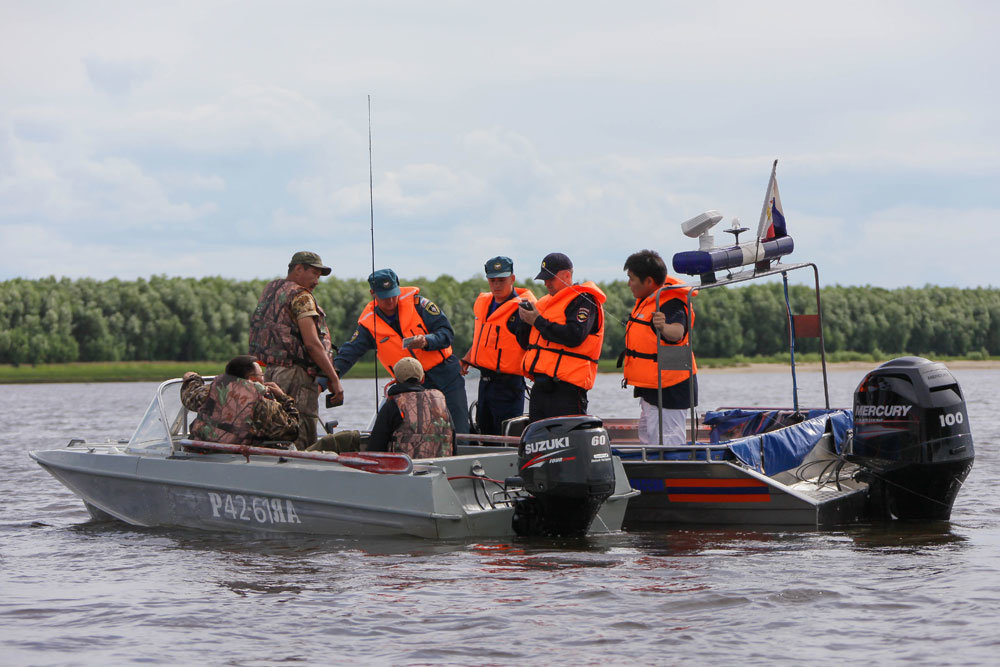Which vessels are registered in the Gims. New law on small boats and their registration
New Rules for state registration of small vessels used for non-commercial purposes have come into force.

Now you can register a small vessel anywhere, and not just where it is physically located. The ship's ticket issued to private owners also looks completely different. Nikolai Kryuchek, the chief state inspector for small vessels, head of the Department for the Safety of People on Water Bodies of the Ministry of Emergency Situations of Russia, told the RG correspondent about these and other innovations.
The Rules and Administrative Regulations have made significant changes to the registration procedure for small vessels used for non-commercial purposes. Separate procedures have been identified, responsible persons have been identified for each stage of the provision of public services, an exhaustive list of documents has been established that can be required for any of the procedures, as well as many other changes aimed at reducing the administrative burden on citizens and simplifying the procedures and their openness, - Nikolai Kryuchek said.
All the innovations that shipowners will experience starting this year were approved by the Ministry of Emergency Situations of Russia dated June 24, 2016 No. 340. In addition, the new Administrative Regulations for the provision of public services for state registration of small vessels, approved by the Ministry of Emergency Situations of Russia dated June 24, 2016 No. 340, came into force. 339.
It is the reduction of the administrative burden on the owners of small vessels that dictates the innovations. This means that, in theory, registering a private vessel should become easier.
As one of the most obvious examples, the inspection gave us this: if, say, a Muscovite bought himself a yacht somewhere on the Black Sea coast, be it Sochi or Crimea, then he will no longer have to go there for the purpose of re-registration. From now on, the new owner just needs to come to the capital’s small boat inspection office of the Russian Ministry of Emergency Situations, or to the inspectorate of any other city, unless, say, there are long queues in Moscow, and register his purchase.
That is, now the registration of boats has become the same as the registration of personal vehicles.
Certificates for all small vessels will also change. The usual little books are irrevocably a thing of the past. The new document looks like an A-4 sheet of paper, that is, approximately the same as the familiar car title. There will be one document, and not like for cars, where in addition to the title, there is also a small laminated registration certificate. But you won't have to carry it with you. It is enough to have a copy of this document with you when going out on the water surface. Moreover, there will be a designation not only in Russian, but also in English language, to make it easier for the owner to go abroad, somewhere, say, in Finnish, Norwegian or Japanese waters. It is clear that these innovations are not very important to the owners of Kazankas and Amurs equipped with Neptune and Vikhr engines.
But now small vessels are becoming more and more modern, with serious sails, engines and navigation equipment. Some Russians even keep them in foreign ports all year round. Innovations will, of course, make their life easier. At the same time, those owners who have an old-style ship ticket - a booklet - do not need to redo it and receive new documents.
You can register a boat, motorboat or yacht where it is convenient for the owner
Just as it will not be necessary to obtain and re-stamp new identification numbers on the sides of boats. Although the new rules provide for registration only with letters, analogues of which are found in both the Russian and Latin alphabet. This innovation is also intended to facilitate shipping in other countries.
It is also interesting that now even on inland waters it is necessary to travel under the national flag. It must be stuffed on board or attached to the spar. This is not a patriotic measure. It is prescribed by the Merchant Shipping Code Russian Federation and the Internal Code water transport Russian Federation. Moreover, for the absence of a flag on board, there is even a fine of 500 to 1000 rubles. This type of punishment is defined in Art. 11.8 of the Code of Administrative Offenses for operating a vessel that does not bear hull numbers or designations.
This rule applies to navigators operating small vessels registered under the new rules, when the requirement to display the state flag of the Russian Federation on board the vessel has become mandatory.
So during inspections, inspectors will not punish fishermen on the long-registered Kazanka and Progress boats for not having a flag on board. They will limit themselves to a warning and reminder of the need to have a tricolor.
The period for providing public services in general cannot exceed three working days.
In accordance with the Federal Law “On the Organization of the Provision of State and Municipal Services” and the Administrative Regulations that have entered into force, it is stipulated that a number of documents necessary to obtain a public service are obtained by the body providing the public service, without the participation of the applicant. Such documents include a declaration for goods or a customs receipt order, information about the applicant’s payment of state duty and an extract from the Unified State Register of Legal Entities, as well as an inspection report for a small vessel (a conclusion based on the results of the provision of state services for the inspection of a small vessel).
An application for the provision of public services can be submitted using the public services portal. The application procedure and the procedure for interaction with the applicant are also established by the Administrative Regulations.
The administrative regulations provide exhaustive grounds for refusal to accept documents or provide public services.
An important issue that owners of small vessels must know is the procedure for formalizing and registering ownership of a vessel. According to Art. 130 of the Civil Code of the Russian Federation, small vessels, subject to state registration, belong, strange as it may seem, to the category of real estate. In fact, from a legal point of view, this only means that the transfer of ownership is carried out only upon the conclusion of a purchase and sale agreement. And the contract is valid only if there is an acceptance certificate at the conclusion of the transaction. And ownership of the vessel occurs only at the time of registration. This was not stated in the rules before.
Now everything is clear and definite. For shipowners who want to personally familiarize themselves with the new rules, this is easy to do. All regulations are published, firstly, in printed form and on, as well as in the “documents” section on the official website of public services. It also contains information about the divisions of the State Inspectorate for Inspectorate of the Ministry of Emergency Situations of Russia, which provide the state service for the state registration of small vessels. Information can also be obtained using the official website of the Russian Ministry of Emergency Situations on the Internet.
In fact, the law has a different name and it sounds like this:
“Federal Law of the Russian Federation dated April 23, 2012 N 36-FZ “On amendments to certain legislative acts of the Russian Federation regarding the definition of the concept of a small vessel.”
However, for simplicity, I will call it the law on registration of small boats. After all, this very moment is the most important for skippers.
What's new in the law on registration of small vessels.
1. The concept of a small vessel has been clarified.
Small boat is a vessel whose length should not exceed twenty meters and the total number of people on which should not exceed twelve.
pleasure boat- this is a vessel, the total number of people on which should not exceed eighteen, including no more than twelve passengers, and which is used for non-commercial purposes and is intended for recreation on water bodies.
Sports sailing vessel is a vessel built or converted for sport, using wind as its main propulsion force and operated for non-commercial purposes.
2. It is stated that the following types of vessels are not subject to registration:
1. Boats and other floating devices that are ship accessories;
2. Vessels weighing up to 200 kilograms inclusive and engine power(if installed) up to 8 kilowatts inclusive;
3. Sports sailing vessels, the length of which should not exceed 9 meters, which do not have engines and are not equipped with rest areas.
Thus, kayaks are now not subject to registration in principle.
And also the overwhelming mass of alloy and motor catamarans and many other frame, rigid-hull and inflatable boats should not be registered.
3. The Code of Administrative Offenses clarifies the concept of a small vessel, and also states:
Article 11.8. Violation of the rules for operating vessels, as well as control of a vessel by a person who does not have the right to control it
1. Vessel control ( including small ones, subject to state registration), not registered in the prescribed manner, or has not passed a technical inspection (survey), or does not bear side numbers or designations, or has been converted without the appropriate permit, as well as having faults with which its operation is prohibited, or in violation of passenger capacity standards, restrictions on area and navigation conditions - entails the imposition of an administrative fine in the amount of five hundred to one thousand rubles.
That is, according to the logic of this article, a small vessel that is not subject to registration should not only not be registered, but also should not undergo technical inspection and wear side numbers.
4. The cost of registering small vessels has been changed.
The Tax Code now specifies the following prices.
For state registration:
- sea vessels - 6,000 rubles;
- inland navigation vessels - 2,000 rubles;
- vessels of mixed (river - sea) navigation - 3,000 rubles;
- sports sailing ships, pleasure boats, small boats - 1,000 rubles.
For state registration of changes made in relation to:
- sea vessels - 1,200 rubles;
- inland navigation vessels - 500 rubles;
- vessels of mixed (river - sea) navigation - 600 rubles;
- sports sailing ships, pleasure boats, small boats - 100 rubles.
For issuing a certificate of ownership, for state registration of restrictions (encumbrances) on rights to a sports sailing vessel, pleasure boat, small boat - 500 rubles.
For issuing a ship ticket - 100 rubles.
5. The RF CVT has added a list of ship documents that must be on a small vessel subject to registration.
On registered sport sailing vessels, pleasure craft, small boats The following ship documents must be available:
1) ship ticket;
2) list of ship crew members (ship role).
Small cars that are not subject to registration, therefore, should not have anything on them. Regardless of the sailing area and other things.
And on the remaining vessels of considerable size that are subject to registration, there must still be an expanded list of documents:
1) certificate of ownership of the ship;
2) a certificate of the right to sail a vessel under the State Flag of the Russian Federation;
3) a certificate of seaworthiness of the vessel indicating its class or with a classification certificate;
4) a list of ship crew members (ship’s role), compiled by the ship’s captain;
5) ship's logbook (logbook or unified logbook), engine logbook (for a ship with mechanical engine operated by members of the ship's crew without combining positions);
6) ship's health certificate;
7) a unified ship inspection book;
8) certificate of prevention of pollution from the ship by oil, sewage and garbage;
9) permission for a ship radio station;
10) certificate or certificate of the minimum composition of the ship’s crew.
6. Also, the following new paragraph has been added to the KVVT, clarifying the concept of “ship ticket”.
Ship's ticket certifies the right of a vessel to sail under the State Flag of the Russian Federation, ownership of the vessel, and the vessel’s seaworthiness.
7. The article on the classification and inspection of ships has been changed in the KVVT, and it now reads as follows:
1. Vessels subject to state registration, with the exception of small vessels used for non-commercial purposes, are subject to classification and survey on a reimbursable basis at the expense of shipowners by organizations that are authorized by the federal executive body in the field of transport to classify and survey ships and which can be created in the organizational and legal form of federal autonomous institutions, as well as by foreign classification societies authorized by the federal executive body authorities in the field of transport for the classification and inspection of ships.
2. Regulations on the classification and inspection of ships, rules for the inspection of ships during their operation, rules for technical supervision over the construction of ships, rules for technical supervision over the manufacture of materials and products for ships, rules for preventing pollution from ships, rules for the classification and construction of ships are approved by the federal body executive power in the field of transport and are published by organizations, foreign classification societies specified in paragraph 1 of this article.
3. Small vessels subject to state registration and used for non-commercial purposes are subject to classification and inspection by a federal executive body authorized by the Government of the Russian Federation.
8. Article 36 of the KVVT has been deleted.
The following norm ceases to apply:
Article 36. Supervision over the safe operation of ships.
1. Supervision over the safety of operation on inland waterways of self-propelled inland navigation vessels with main engines with a power of at least 55 kilowatts, non-self-propelled vessels with a capacity of at least 80 tons, passenger and liquid vessels, ferry crossings is carried out by the State River Shipping Inspectorate.
2. Supervision of the safety of operation on inland waterways of sports sailing and recreational sailing vessels, regardless of the presence and power of the main engines and the capacity of such vessels, other sports and recreational vessels, regardless of the number of passengers on them, including sports and recreational self-propelled vessels with main engines engines with a power of at least 55 kilowatts, sports and recreational non-self-propelled vessels with a capacity of at least 80 tons, is carried out by the State River Navigation Inspectorate to the extent that is not within the competence of the bodies carrying out state registration of ships and technical supervision and classification bodies of ships of the Russian Federation.
3. The State River Navigation Inspectorate with its constituent state river navigation inspection basins shall carry out:
- Supervision of compliance by shipowners, ship crew members, legal entities and individual entrepreneurs engaged in navigation on inland waterways with the requirements for ensuring the safe operation of ships in accordance with the legislation in the field of inland water transport of the Russian Federation;
- Investigation and classification transport accidents with ships on inland waterways;
- State registration of ships in the State ship register Russian Federation and issuance of certificates of the right to sail under the State Flag of the Russian Federation and certificates of ownership of the vessel;
- Testing knowledge and participation in certification of ship officers, inspection of ships;
- Supervision of the proper maintenance of ship passages and navigational equipment;
- Supervision of compliance with requirements for ensuring the safe operation of ships.
In relation to the vessels specified in paragraph 2 of this article, these powers are exercised by the State River Navigation Inspectorate to the extent that is not within the competence of the bodies carrying out state registration of ships and the technical supervision and classification bodies of ships of the Russian Federation.
4. Instructions of officials of the State River Shipping Inspectorate to ensure the safe operation of vessels are mandatory for shipowners, ship crew members, legal entities and individual entrepreneurs operating navigation on inland waterways. The State River Navigation Inspectorate is obliged to immediately notify the indicated persons of such instructions.
5. Supervision over the safety of operation of ships not specified in paragraphs 1 and 2 of this article is carried out by bodies authorized to do so by the Government of the Russian Federation.
9. The bodies carrying out state registration have been clarified.
- State registration of ships in the State Ship Register and Bareboat Charter Register is carried out by the captain of the seaport.
- State registration of ships in the register of small boats is carried out by bodies authorized by the Government of the Russian Federation.
- State registration of ships in the Russian International Register of Ships is carried out by seaport captains, the list of which is approved by the Government of the Russian Federation.
10. A number of, in my opinion, minor changes have been introduced, which in this review did not deserve my attention.
Questions can be asked in the comments. But it is unlikely that I will be able to answer more than what is written here.
Addition
In connection with the entry into force of the Federal Law of April 23, 2012 No. Zb-FZ “On amendments to certain legislative acts of the Russian Federation regarding the definition of the concept of a small vessel” on May 28, 2012, the GIMS Office explained the procedure for applying certain provisions of this Federal Law before the entry into force force of the relevant by-laws.
I’ll make a reservation: I found this explanation on one motorboat forum, and where the legs of the document come from - I still don’t understand. If someone can provide a link to the official page with his publication, I will be grateful. If it exists at all.
I never found the original text of the explanation, so for now it can be considered simply as an “explanation” and nothing more. It’s worth paying attention to it, but you don’t need to follow it yet.
The text of the explanation will be below, but for now it is worth noting what GIMS means by the mass of the vessel:
"6. The weight of the vessel is determined in accordance with GOST 19356-79 "Recreational rowing and motor vessels. Test methods."
Now let’s look at what GOST means by vessel weight:
1.3.2. The weight of the vessel, fully equipped with ship equipment and supplies, should be determined by weighing.
Those. The weight is determined not by an entry in the passport, but by weighing, taking into account the entire configuration.
But here it will be necessary to clarify what is meant by “complete set”.
But in general, it seems that motors are also included here:
1.2.4. Inboard engines and outboard engines intended for installation on the test vessel must undergo a break-in period and technical indicators be within the limits specified in technical conditions for break-in.
And now the text of the explanation.
"In connection with the entry into force of the Federal Law of April 23, 2012 No. Zb-FZ “On amendments to certain legislative acts of the Russian Federation regarding the definition of the concept of a small vessel” (hereinafter - the Law) on May 28, 2012, the GIMS Department explains the procedure for applying certain provisions of this Federal Law before the entry into force of the relevant by-laws.
1. From the moment the Law comes into force, state supervision is exercised over small vessels used for non-commercial purposes, subject and not subject to registration in the register of small vessels.
2. For the purposes of state registration in the register of small vessels, the definition of “marine pleasure craft” is excluded. Vessels previously classified as pleasure boats are registered as a “boat” during state registration in the register of small boats. For certification purposes, the definition of “marine pleasure craft” remains until the administrative regulations on certification for the right to operate small vessels come into force.
3. Due to the fact that the Law does not have retroactive force, vessels previously registered in ship books and not subject to state registration in the register of small vessels in accordance with the Law, registered before May 28, 2012, are not subject to forced deregistration accounting.
Upon receipt of an application from the owner of such a vessel for its next survey, the applicant must be explained that his vessel, in accordance with the Law, is not subject to inspection by the GIMS authorities. The applicant must be asked to complete the procedure for deregistering the vessel with the state GIMS authorities and contact the registration authority in accordance with the Law (master of the seaport, captain of the river port / territorial body of Rostrans Supervision / State Basin Administration of Waterways and Shipping).
In relation to vessels that are not subject to state registration (weighing less than 200 kg inclusive and engine power (if installed) up to 8 kW inclusive), which were registered before the Law came into force, carry out the procedure for deregistration from state registration only at the request of the owner. In accordance with the requirements of the Law, Articles P.8 and 11.13 of the Code of Administrative Offenses in relation to ships that are not subject to state registration (weighing less than 200 kg inclusive and engine power (if installed) up to 8 kW inclusive) do not apply until further clarification. The law enforcement practice of the remaining articles in relation to small vessels remains unchanged.
4. The purpose of using a small vessel (commercial or non-commercial operation) is established upon the application of the shipowner. In relation to ships registered before the Law came into force, during the next survey of a small vessel, a corresponding application from the shipowner is required. If the applicant indicated that the vessel is used for commercial purposes, be guided by paragraph 2 of paragraph I of this letter. When state registration of a small vessel after the Law comes into force, require the applicant to make an entry in the registration card - application that the vessel will be used for non-commercial purposes.
5. In relation to ships registered before the entry into force of the Law, the maximum number of people on board is determined during the next survey of a small craft by requesting a corresponding application from the applicant.
6. The weight of the vessel is determined in accordance with GOST 19356-79 “Pleasure rowing and motor vessels. Test methods". As the length of the vessel for the purposes of state registration, according to the Law, apply the definition of “maximum length of the vessel (HDV)” given in GOST 1062-80 “Arrangement of surface ships and main vessels. Terms, definitions and letter designations."
7. Registered and unregistered small vessels do not undergo regular inspection by the GIMS authorities:
a) rowing vessels owned by individuals used on water bodies outside the sea;
b) small vessels weighing up to 200 kg inclusive and an engine (if any) up to 8 kW inclusive, that is, vessels not subject to state registration in accordance with the Law.
Registration of vessels in the ship books stops from 24-00 on May 27, 2012. From 00-00 on May 28, 2012, registration of small vessels in the register of small vessels begins. The form of the register of small vessels corresponds to the form of the ship's book.
The assignment of registration (side) numbers following the last number registered in the ship's book continues in the register of small boats. The serial number of an entry in the register begins with the number “1”. The end of the ship's book is marked by the entry “Maintaining the ship's book has been terminated due to the entry into force of the Federal Law of April 23, 2012 No. Zb-FZ “On amendments to certain legislative acts of the Russian Federation regarding the definition of the concept of a small vessel” after the last registration entry. The entry is certified by the signature and seal of the responsible official (the head of the division of the registration authority in which the ship's book is located) indicating the end date of maintaining the ship's book.
A new book with the inscription “Register of Small Vessels” is used as a register of small vessels. The register of small vessels consists of sections “Small vessels owned by legal entities” and “Small vessels owned by individuals”. Each section contains two subsections: “motor and motor-sailing vessels” and “rowing and sailing vessels”. The register of ships of each subsection is kept in a separate book.
8. When carrying out supervisory activities over small vessels, the ship’s role in the composition of ship documents should not be required until further notice.
9. From the moment the Law comes into force, when conducting a survey of a small vessel, payment of the state fee for issuing a certificate of seaworthiness of the vessel is not carried out, and the issuance of a technical inspection coupon is terminated. 10. All regulatory legal acts in force in relation to small vessels supervised by GIMS remain in force and are applied, to the extent not inconsistent with the Law, until further notice."
On May 24, a new federal law No. 36 came into force, which introduces serious changes to the operation of small vessels and, therefore, affects the interests of many of our readers who are owners of such watercraft. From letters and calls to the editor it is clear that the text of the law leaves many practical issues unclear regarding the registration and deregistration of watercraft, the rules of their operation, etc. We have collected the most FAQ our readers and tried to find answers to them. In this we were helped by consultations with GIMS employees, as well as a special instruction explaining the new law, which was sent to all regional centers of the Ministry of Emergency Situations by the chief state inspector for small vessels of the GIMS EMERCOM of Russia V.V. Seryogin.
Which boats and motors are no longer subject to state registration?
Since the entry into force of Law No. 36-FZ, boats weighing up to 200 kg inclusive and motors with a power up to 8 kW inclusive should not undergo state registration. That is, even such boats as, for example, “Crimea”, “Yuzhanka” or “Ob” are no longer subject to registration.
True, there is one thing: how is the mass of the ship determined? In the explanations to the law V.V. Seregina said that “the mass of the vessel is determined in accordance with GOST 19356-79 “Recreational rowing and motor vessels. Test methods." Let's see what this same GOST says about this: “The mass of a ship, fully equipped with ship equipment and supplies, should be determined by weighing.” That is, the weight is determined not by the boat’s passport, but by weighing the vessel, and a fully equipped one. Question: if the boat is equipped outboard motor with a power of up to 8 kW and its weight in this configuration exceeds 200 kg, is it subject to registration or not? All the GIMS specialists to whom we asked this question were unanimous: the weight of the boat is estimated together with the engine. That is, for example, if you are sailing on the Crimea boat, which itself weighs 190 kg, under a 10-horsepower Suzuki weighing 20 kg, then such a craft must be registered.
Is it necessary to undergo technical inspection of watercraft that are not subject to registration?
The GIMS clarification clearly states this: no, it’s not necessary. You just have to keep in mind that if you have a boat weighing less than 200 kg with an engine more powerful than 8 kW, then such a watercraft will have to be registered in the prescribed manner and, accordingly, undergo technical inspection.
In addition, according to the new procedure, one category of registered small vessels is exempt from inspection. These are “rowing vessels owned by individuals and used in inland waters.” In other words, if you have, for example, a wooden rowing boat weighing more than 200 kg, then you will have to register it, but you do not need to take it for an annual inspection.
What should owners of previously registered watercraft do, which, according to the new procedure, do not require registration?
Firstly, such watercraft are not subject to forced deregistration. That is, you can safely use your boat and forget about the need for technical inspection. But at the same time, you shouldn’t forget about two things. The first is transport tax. As long as the boat is listed in the ship's register as a registered watercraft, you will receive notices from the tax office about the need to pay tax. The second thing you should not forget about is the risk of various troubles in the event that your boat is stolen and then some kind of crime is committed with its help. It will take a long time to prove that you have nothing to do with it.
In order to deregister a boat, the owner must submit a corresponding application to the State Inspectorate of the Inspectorate at the place of registration of the craft.
If a watercraft subject to state registration has already been registered, does it need to be re-registered again in accordance with the new law?
No no need. Until May 27, ships were registered in the ship books according to the previous procedure. On May 28, registration of small vessels began in accordance with the new law in the register of small vessels. In this case, the assignment of hull numbers following the last number registered in the ship's book continues in the register. That is, the previous registration is retained, as are the tail numbers.
Is it necessary for a small craft subject to state registration to have a properly registered ship's role?
Indeed, the new law requires that the documents on board a registered small boat include a ship's role. However, in the GIMS explanations there is a special paragraph on this matter: “When carrying out supervisory activities over small vessels, the ship’s role in the composition of ship documents is not required until special instructions.”
Thus, “until further notice” you don’t have to worry about formalizing the ship’s role.
Do I need to be certified to operate a small boat with an engine of less than 10 horsepower?
Before Law No. 36-FZ came into force, it was possible to manage motor boat, without having a driver's license only if the engine power did not exceed 5 hp. The GIMS clarifications to the new law on this matter say the following:
In accordance with the requirements of the Law, Articles 11.8 and 11.13 of the Code of Administrative Offenses in relation to ships not subject to state registration<..>, do not apply until further clarification.
These articles of the Code of Administrative Offenses precisely regulate the availability of a certificate for the right to operate a vessel and sanctions for its absence. That is, if you have a motor with a power of up to 8 kW inclusive and a boat weighing up to 200 kg, then a driver’s license is not required.
No less definitely answered the question about driver's license and Deputy Head of the GIMS Department of the Ministry of Emergency Situations of Russia N.A. Kryuchek in his letter dated May 23, 2012: with the entry into force of Federal Law No. 36-FZ, “the grounds for presenting to the owners of small vessels weighing (not carrying capacity) less than 200 kilograms with an installed motor with a power of less than 8 kilowatts are requirements for their registration and availability of a certificate for there will be no right to operate a small vessel.”
We deliberately dwelled in more detail on the issue of driver’s licenses and provided relevant excerpts from official documents so that fishermen would have solid arguments in the event of a possible conflict on the water with a GIMS inspector.
How will the state duty for registering a small vessel and for undergoing its technical examination change?
The state fee for registering a small craft will be 1,000 rubles. But as for the technical examination, the explanations of the GIMS say the following: “From the moment the Law comes into force, when carrying out an examination of a small vessel, payment of the state fee for issuing a certificate of seaworthiness of the vessel is not carried out, and the issuance of a technical examination coupon is terminated.”
Of course, in this article we have not answered all the questions that owners of small boats may have in connection with the new law. This topic will definitely be the focus of our attention in the future.









